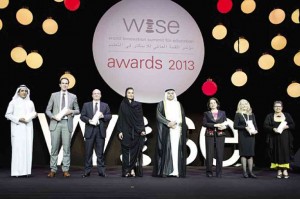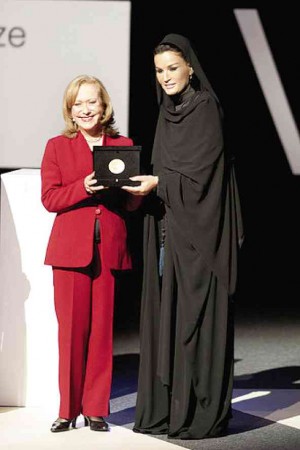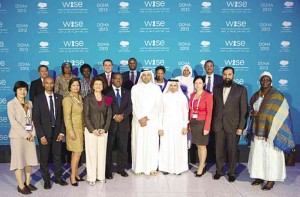Words from the WISE

THE SIX winners of the 2013 WISE Awards for their groundbreaking projects in education with Sheikha Moza and Sheikh Abdulla at the WISE Gala Dinner
Too many people think they know what is wrong with education today. This was obvious at the 5th World Innovation Summit for Education (WISE) that was held recently in Doha, Qatar. But it was also obvious that far more people were desperate to find out what would work in the schools of today. Around 1,200 of them came from all continents of the world to the three-day conference, eager to stumble upon an education miracle to take home with them.
The speakers, movers and shakers at WISE tackled the timeworn education issues of access and quality. In other words, how to educate every person on the planet and how to do it well. Pioneers, decision makers and practitioners, they came from as diverse backgrounds as education, technology, business, government, and social entrepreneurship. This time around, they directed the international delegates to the refrain of “Reinventing Education for Life.”
But how do you even begin to make a meeting as mammoth as WISE work?
First, you must have a central, charismatic figure leading the way. Annually, since 2009, WISE has been hosted by Qatar Foundation for Education, Science and Community Development, which is chaired by Sheikha Moza bint Nasser Al Missned.
Stunning, elegant, articulate and smart, Sheikha Moza is wife to Qatar’s former ruler Sheikh Hamad bin Khalifa Al Thani and mother to Sheikh Tamim bin Hamad Al Thani, the present emir of the richest country in the Gulf, if not the world. She was present at the summit’s most important sessions and hosted as well the gala dinner where this year’s WISE awardees were honored for outstanding innovations in education.
Article continues after this advertisementYou must also have an equally stunning venue. Qatar National Convention Center is an ultramodern, multilevel facility with a main conference hall and a series of meeting rooms perfect for the ambitious program laid out for the WISE participants—the plenaries on the big issues, the focus sessions on innovative projects, the debates on pressing topics, the workshops for sharing expertise and the open programs designed for interactivity.
Article continues after this advertisementMost important, you must present a problem so great and unnavigable it demands a global meeting of the minds and poses a challenge to both experts and stakeholders. And what could be more pressing than education?
“Every year we assemble at WISE to invent solutions that will advance and ensure universal education,” said Sheikha Moza at the opening session. “The challenges are great, and much work is needed. It cannot be achieved without the spirit of WISE.”
She spoke of the bond between education and life, the summit’s theme. “The more education thrives, the more prosperous life becomes. The more it languishes, the more life fades. There is nothing more beneficial to life than education, and nothing matches its ability to influence and change.”
No learning program in the world today drives home this point as well as Fundación Escuela Nueva and for this reason its founder and director, Vicky Colbert, won this year’s WISE Prize for Education, an award started in 2011 “to enhance the status of education by giving it prestige similar to other areas for which international prizes already exist, such as literature, peace and economics.”
Escuela Nueva was born of a need to upgrade education in rural Colombia in 1975. Colbert’s model placed pupils at the heart of the learning process, turned teachers into facilitators and

SHEIKHA Moza with the 2013 WISE Prize awardee Colbert, founder and director of Fundación Escuela Nueva in Colombia
involved the entire community. It was a pedagogy that gave consideration to the students’ daily lives. The approach eventually became a national policy in Colombia in the 1980s. Today, more than 5 million children are educated the Escuela Nueva way throughout South America as well as in Mexico, the Caribbean, East Timor and Vietnam.
To drive home the theme of how fundamental learning is to life, French sociologist and philosopher Edgar Morin gave a special address that proved that, even at 92, he clearly deserved to have an entire stage all to himself.
Speaking in French, Morin said education was not only about mastering literacy, numeracy, various sciences or vocational training, although such skills were essential.
“To live is to face the complex issues of truth, error and illusion,” he said, adding that it was essential to bring these notions into the teaching and the learning of children from an early age.
Morin went on to cite other weaknesses in modern education. “We are never taught who human beings are,” he said. “Human nature is complex … we are psychological individuals, social individuals and biological individuals … Each of us is 100 percent biological, 100 percent psychological and 100 percent social.” These three dimensions are intertwined in every human being and they are essential in understanding an individual, he said.
“Learning to live is learning to deal with vital issues of life that today’s education does not address,” he said in closing.
As if in response to Morin’s concerns, on the WISE agenda on Day One was 21st-Century Citizenship where participants reflected on universal values for global citizenship and how to teach them. Throughout the three days, experts debated on such topics as how to make basic literacy and numeracy goals a reality; how much science, technology and mathematics students really needed and how they could be taught most effectively; whether we could do away with teachers, or whether massive open online courses were really expanding the access to education.
For the first time at WISE, education ministers were invited for a session all their own. Coming from 19 countries, including the Philippines, the education officials shared best practices and how to replicate them.
“What impressed me was the growing consensus among us that educational concerns especially for the last mile, meaning the last million who are still unable to access even primary education, cannot be addressed individually by each state but only by working together as a global village,” said Education Secretary Armin Luistro. “The challenge is whether there will be political will to address this concern as a community of nations.”
But things are starting to look up, particularly with the report from Educate A Child (EAC) and its partners that they are meeting the timeline for getting 2 million out-of-school youth into education programs after just a year since its launch. EAC is a program under Education Above All, another WISE initiative that envisions to educate all children in disadvantaged areas, particularly the 57 million who are currently out of school.

INAUGURAL MINISTERS SESSION Qatar Minister of Education and Higher Education Mohammed Bin Abdul Wahed Ali Al Hammadi and top education officials from 19 countries, including Education Secretary Luistro (extreme left, back row)
More good news came by way of the six projects that merited the 2013 WISE Awards for Education, which were given out during the gala dinner. The winning projects were Medersat.com
(reach: Morocco), Pathways to Education (Canada), Promoting Equality in African Schools (Uganda/Zambia), iThra Youth Initiative (Saudi Arabia), Te Kotahitanga (New Zealand) and Alison-A New World of Free Certified Learning (Ireland). Each received $20,000. No education project in the Philippines has won the award.
Another good news came during the closing address of WISE chair Sheikh Abdulla bin Ali Al Thani when he announced the creation of The Future of Education Fund. “WISE will launch an innovation fund to foster education innovators and entrepreneurs. The fund will provide financial assistance, as well as expertise and training, to help them translate their ideas into action. It will initially be supported by Banco Santander, and I invite other organizations to join us.”
It was a wonderful way to end a summit that is constantly seeking ways to reinvent learning to benefit all learners of the world.